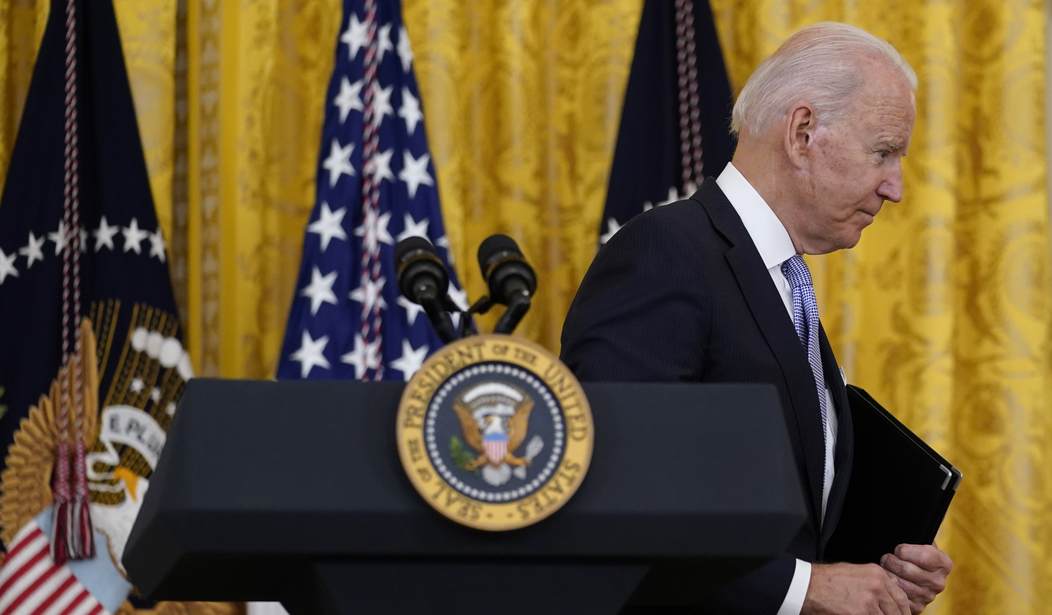If Joe Biden played checkers in a chess game in his catastrophic withdrawal from Afghanistan, he’s playing Tic-Tac-Toe in his distraction campaign against the US intel community. And losing, too. Sources at the CIA have pushed back against suggestions that the White House lacked intel on the potential for a fast collapse, and tell NBC News they warned repeatedly about the probability:
As the Taliban began seizing provinces across Afghanistan in recent weeks, the CIA’s intelligence assessments began to warn in increasingly stark terms about the potential for a rapid, total collapse of the Afghan military and government, current and former U.S. officials told NBC News.
In the end, the CIA’s description of what a worst-case scenario could look like “was pretty close to what happened,” one former official briefed on the matter said.
The White House won’t confirm whether President Joe Biden ever received such a dire forecast from his national security team. The president himself appeared to dispute a month ago that intelligence suggested the increasing likelihood that the Afghan military would fold.
Not only did the CIA predict this, NBC’s sources claim, they were dumbfounded when Biden doubled down on the speed of the withdrawal:
CIA officials were taken aback by the rapid pace of the military’s pullout, including the dead-of-night withdrawal from Bagram Air Base in July, according to the former official. And many officials are expressing annoyance at the State Department, which officials say was extremely slow in processing the paperwork needed to deal with Afghan translators and others eligible for resettlement.
The military isn’t taking these leaks lying down either. They are talking to the Wall Street Journal about their own warnings on Afghanistan and frustrations that the White House and State Department didn’t take them seriously:
The president’s top generals, including Chairman of the Joint Chiefs of Staff Army Gen. Mark Milley, urged Mr. Biden to keep a force of about 2,500 troops, the size he inherited, while seeking a peace agreement between warring Afghan factions, to help maintain stability. Defense Secretary Lloyd Austin, who previously served as a military commander in the region, said a full withdrawal wouldn’t provide any insurance against instability.
In a series of meetings leading up to his decision, military and intelligence officials told Mr. Biden that security was deteriorating in Afghanistan, and they expressed concerns both about the capabilities of the Afghan military and the Taliban’s likely ability to take over major Afghan cities. …
White House aides have said Mr. Trump’s deal limited their options and risked the possibility that Mr. Biden would need to deploy more troops if he ignored the agreement and delayed the withdrawal.
Yet the Biden team was blindsided by the pace at which the Taliban marched across the country. The White House miscalculated the willingness of the Afghan army to fight. U.S. intelligence agencies predicted Kabul might fall to the Taliban in 30 to 90 days. The president himself last month said the Taliban takeover was “not inevitable.”
Clearly, that’s horses***, if these leaks are accurate. And if so, this is a dire look for the White House. Their warnings preceded the infamous July 8 press conference, in which Biden insisted that the Taliban couldn’t rapidly sweep the country. Those also preceded the July 21 briefing by Lloyd Austin and Mark Milley at the Pentagon insisting that the US would continue to support the Afghan military in its mission at the same time Biden was withdrawing logistical and intelligence cooperation.
Again, self-serving leaks from the intel community are nothing new (just ask Donald Trump, Barack Obama, and George Bush), but the nature of these leaks only matters if they’re not true. After Biden and his team went after the intelligence, you’d better believe that these agencies are collecting the receipts and readying them for Congress, if not the media. As Jim Geraghty writes, this has turned into a crisis of confidence in Joe Biden, and a crisis of competence as well:
What’s the point of having a well-funded, top-tier intelligence community and experienced military advisers if the president simply ignores their warnings, disregards their information, and trusts his gut that everything will turn out fine?
Biden could not even be convinced to delay his preferred policy to when it would do the least damage. Jon Sopel of the BBC observes that “in Afghanistan there is a fighting season which starts in spring — and then in winter, when the country freezes over, there is a time when the Taliban go home to their tribal homelands. Did no-one think that it might have been better to have ordered the withdrawal for the dead of winter when Taliban forces weren’t there, poised to fill the vacuum?”
It’s not that no one thought about it. It’s that no one cared. In fact, the WSJ account from their leakers paint Jake Sullivan and Antony Blinken in a particularly pusillanimous light:
Other advisers, including Secretary of State Antony Blinken and national security adviser Jake Sullivan, raised the possibility of Taliban attacks on U.S. forces and diplomats as well as the Afghans who for two decades worked alongside them. Ultimately, neither disagreed with the president, knowing where he stood.
A real Profiles in Courage moment, eh?








Join the conversation as a VIP Member